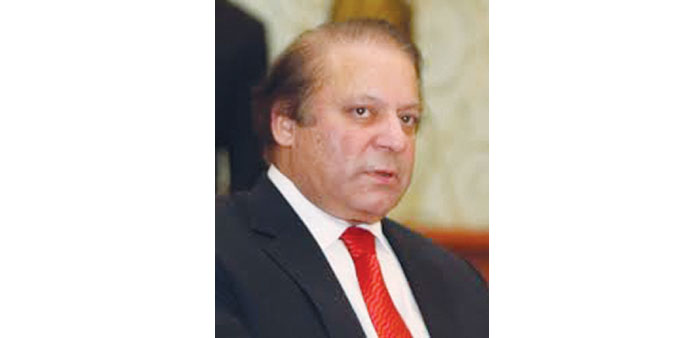AFP/Islamabad
Islamabad will “intensify” efforts to find a diplomatic solution to the Yemen conflict, Pakistan’s prime minister said yesterday, after parliament voted to keep the country out of the Saudi-led coalition against anti-government rebels.
Nawaz Sharif said the restoration of Yemeni President Abd-Rabbu Mansour Hadi’s government, overthrown by Houthi Shia rebels, would be an “important step forward towards establishing peace”.
The Pakistani parliament on Friday unanimously voted to remain neutral in the Yemen conflict, rebuffing long-term ally Riyadh’s request for troops, war planes and ships.
UN chief Ban Ki-moon says more than 600 people have been killed since the Saudi-led coalition began air strikes against the rebels on March 26.
Pakistan has pushed efforts to find a negotiated end to the fighting, holding talks last week with Iranian and Turkish officials to pursue this.
“Pakistan will intensify its diplomatic efforts in the coming days, in consultation with the leadership of Saudi Arabia, to resolve the crisis,” Sharif said in a statement delivered to television cameras.
Saudi Arabia accuses Tehran, the major Shia power, of backing the rebels and has vowed to bomb the fighters to pressure them to surrender and prevent a pro-Iran state setting up on its doorstep.
Iranian Foreign Minister Mohamed Javad Zarif visited Islamabad for talks last week and Sharif said he warned him that the overthrow of Hadi’s “legitimate government in Yemen... had set a dangerous precedent that was fraught with serious risks for the entire region”.
Sharif, who is personally close to the Saudi royal family after they sheltered him following his 1999 overthrow, repeated earlier assurances that Pakistan stood ready to defend the oil-rich kingdom’s territorial integrity.
He also sought to play down a row with the United Arab Emirates that blew up over the weekend after the Gulf state’s foreign minister slammed the parliamentary resolution as “contradictory and dangerous and unexpected” and accused Islamabad of siding with Iran.
Sharif said Pakistan’s solidarity with Gulf states was not in doubt and the row was the result of “an apparent misinterpretation” of the resolution.
Saudi Arabia’s minister for religious affairs arrived in Pakistan late on Sunday, two days after the country’s parliament rejected a Saudi appeal for support for its military intervention in Yemen.
“The resolution passed by Pakistan’s parliament is Pakistan’s internal matter,” Saleh bin Abdul-Aziz bin Mohamed al-Sheikh told reporters at the airport.
He added: “We have very good relations with Pakistan, and we expect a lot of good from it. Pakistan is a very important country, it is a big country in the Islamic world.”
“Pakistan and Saudi Arabia have had very strong relations ever since Pakistan’s creation...we should try and improve these ties as best we can.”
He is expected to return to Saudi Arabia today, a foreign office official said. His schedule was not made public.
Saudi Arabia is concerned that the violence could spill over the border it shares with Yemen, and is also worried about the influence of Iran, which has denied Saudi allegations it has provided direct military support to the Houthis.
Islamabad has found itself in an awkward position on Yemen. It has deep military and religious ties to Saudi Arabia and has long benefited from the kingdom’s largesse.
Saudi Arabia’s request to Pakistan presents Prime Minister Nawaz Sharif with a dilemma. Last year, Saudi Arabia gave Pakistan a $1.5bn loan. It also sheltered Sharif for many years when he went into exile after a 1999 coup.
But Pakistan lawmakers fear the Yemen conflict could degenerate into a sectarian conflict, fuelling violence at home and along the long, porous border that Pakistan’s mineral-rich province of Baluchistan shares with Iran.

Nawaz Sharif
